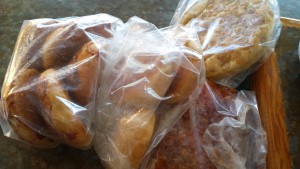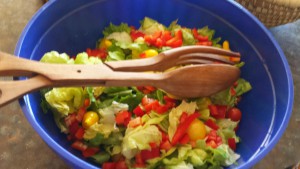Wednesday
Community ArticlesLocal, Healthy Fare at Windhorse Retreat Center
COLUMN: KITCHEN WISDOM
by Lisa Harris, Column Co-Host
Sue Firer is the manager of Windhorse Retreat Center, the only Shambhala land center in the Midwest. She is likely to be in the kitchen cooking up healthy fare for all of the participants during programs and retreats. I recently spoke with her about food, cooking, practice and Shambhala.
Lisa: I know you are into cooking and healthy ingredients. The food you prepared at the program I attended was delicious – and so fresh. I’m curious about your interest in food and where it came from.
Sue: I got interested in cooking from my mom. She used to do everything from scratch. I watched her cook and sometimes I helped her. My love of food initially came from my mom. There were seven of us, and we begged her to take us to fast food restaurants, and she would say, “Oh, I can make it here.” I’m really happy in retrospect that she didn’t let us go out for fast food.
Lisa: How does good food pertain to your life now, and your practice?
Sue: It limits where you can eat – at least it did in the years of eating food at college when I was a vegetarian. I didn’t start cooking until my mother was dying. I quit teaching and moved in with her and then started cooking more. It was out of necessity at the retreat center that I started cooking for more people, where I served about 80% – 90% organic food. After I got more comfortable cooking I used fewer prepared foods, and I realized it was cheaper. It was mainly vegetarian for a while at the retreats, but people started asking for meat and I started to eat meat and really enjoyed it – buying it locally, having grassfed and free range and all that. I appreciate that, too.
“Human happiness is based not just upon individual gratification; the happiness of humans is directly associated with the ability to share.” The Shambhala Principle – SMR
Lisa: How do you reflect the Shambhala Principle and enlightened society in what you do with food?
Sue: I did all this stuff before I knew about Shambhala. To me, it’s reflected in knowing where your meal is coming from. But out of respect and appreciation for all of the sentient beings – vegetables, the soil, the worms, all that stuff, certainly the elements. To know where it comes from, to have it as local as you can, and support people that are doing really good things and making a living doing things properly without poisoning. And of course keeping your body healthy – body and mind – there’s no separation there.
Offering that to other people, too, I love. It always surprises me how many people don’t eat organic. It’s kind of mind boggling. It’s nice at retreats to hear people say, “that’s delicious!” Then you also offer them a possibility, even though they think it’s too expensive. But it’s not more expensive. You offer that to people as well, a way to feel better, and let them know it actually is do-able. I suppose that’s wisdom and intelligence, to let someone else see that. Globally, if you buy more locally and without pesticides and all that, it just promotes a more sane and sustainable world. Also, with the Shambhala Principle – enlightened society begins with you and me – I picture the Seelys, Peter and Bernadette, who have the farm. We have a relationship. And if I buy stuff at the local farmers’ markets I see the people who raise the animals.
“The power of ceremony is that through the rituals of our day, we understand who we are. In details such as what food we eat or how we use our time, we are creating self-identity and establishing value systems.” The Shambhala Principle – SMR
Lisa: What about life as a ceremony?
Sue: I feel like when I’m cooking, it’s definitely meditative and mindful. You could almost say it’s a ceremony. How I do it, and how I pay attention.
Lisa: I would think that programs like the weekthün I attended there have a sense of ceremony because of the daily schedule, and how everyone gets together to eat at a set table in the shrine room.
Sue: It is a ceremony of setting the table, eating together, the kind of householder ceremonies – but with a bunch of strangers that now all of a sudden you’re so connected to, and you’re eating meals together, cleaning up together, setting up together. It’s pretty cool.
“Good human society comes about through strength in our interchanges with others.” The Shambhala Principle – SMR
Lisa: The household is a big view of Kitchen Wisdom: how you are in your household, how you welcome others into it, and the hearth as the center. If you all sit together, set the table, use a certain set of dishes for certain occasions…how you are with others. Playing with others at the dinner table.
Sue: Yeah – in the beginning it may seem like it’s not part of the retreat, really. It’s not part of the practice. Then they say, holy cow – this is cool. This is part of the whole thing. You see people start pitching in. That’s why I sometimes like to not have an assigned rota – because people just jump in.
Lisa: You like to cook for people and at home. Is there something different for you when you cook for retreats, that draws you to that, or is it just another space for you to do that?
Sue: At its core I don’t think it’s different. I like making people happy, I like people enjoying the food. I like making healthy meals for people, with food that’s not tainted. But part of retreat cooking is thinking about everybody and who has allergies, and creating a big menu. It’s fun to actually work with it, the restrictions, and how I can make the main meal incorporate those restrictions. And it’s still a really delicious meal.
Lisa: What else have you learned from cooking for retreats – for Shambhala and others?
Sue: The energy of the cook goes into the food. People know if you’re pissed off or stressed, or if it’s just a job. I recently cooked for a retreat in Montana, and many of the participants said, “we can just tell you love us!” It was very cool.
Lisa: Does cooking have any similarity or connection with your Kasung work?
Sue: Right away, meditation in action. Kasung is meditation in action, cooking is, too. I never specifically thought about it, but the whole protection thing, the protector principle. I think cooking very much goes under that. Protecting people’s well-being, making sure everybody is ok. Being precise and disciplined, definitely. Having a big picture. Kasung is actually a feminine principle and practice. I think cooking is as well. Protection in terms of mind and body. When you’re cooking you need to keep the schedule and you need to keep precise. It really is caretaking and service, which is what Kasung is as well.
For more information:
Windhorse Retreat Center – http://windhorse.shambhala.org
Springdale Farm – http://www.springdalefarmcsa.org
Niman Ranch – http://www.nimanranch.com/Index.aspx
Outpost Natural Foods – http://www.outpost.coop
~~
 Lisa Harris is a writer, free-range chef, and consultant living in Northern Indiana where she supports Local Food Systems, Sustainability, Healthy Wild Habitats & Ecosystems. Contact her at [email protected], and see what she’s up to on her website http://thesavorymuse.com.
Lisa Harris is a writer, free-range chef, and consultant living in Northern Indiana where she supports Local Food Systems, Sustainability, Healthy Wild Habitats & Ecosystems. Contact her at [email protected], and see what she’s up to on her website http://thesavorymuse.com.







Apr 2, 2015
Reply
Hi Abbey. My partner and I have a dog too. Dogs evolved as meat eaters, like their cousins in the wild. There’s no real choice there. But humans have a choice. Many eat meat because they think its the only way for the body to get the protein it needs. Not anymore though. Sources of non-meat protein, even products that replicate meat, are readily available. Like you, I see a huge difference between the factory farms that treat animals horrifically and those that treat them with compassion while they are alive. Of course, meat consumption is here to stay. But slaughter is slaughter, no matter how humane the treatment prior to slaughter. Shouldn’t we at least do what we can to reduce the suffering of other sentient beings. Sometimes compassion requires sacrifice. At the very least, cut back on meat consumption. As Buddhists, we should set the bar higher, especially when we, more that any other group I know, outwardly express compassion for “all sentient beings”, not just human beings. We should walk the walk as well as talk the talk.
Apr 1, 2015
Reply
Hi Michael and Sue,
Just wanted to jump in to add another viewpoint about the meat or no-meat diet. This is something I’ve spent a lot of time contemplating. I believe there are many things to take into consideration in this debate, for example, I know some people who have tried to become vegetarian, but found that it was not healthy for them. In my case, I was a vegetarian for 6 years before I encountered a little stray dog, who has been my companion for the last 11 years. At that time, I was traveling in Europe and decided to begin eating meat again, sparingly, for the cultural experience of eating local foods. I also realized that because of my dog’s dietary needs, I would be taking part in the meat industry, in order to nourish him. My feeling is that it is compassionate to support the segment of the meat industry that takes a compassionate approach toward raising animals. The factory farm system views animals as commodities, not beings, and the whole situation is very painful. If the meat industry is to change, it is not going to come about through eliminating it altogether. There will always be people who want to, or need to, eat meat. Therefore, I feel it is important to support those farmers who are working in harmony with the land and with compassion and appreciation for the animals they raise.
Mar 30, 2015
Reply
Hi Sue. Thanks for your response. No need to continue the discussion. I think it’s fair to say that people have basic disagreements regarding the morality of consuming meat that are unlikely to be resolved, at least on a large scale. On the other hand, I think a public debate like this is healthy. Perhaps we would agree that this particular issue cuts right to the core of Buddhist principles and practice. It’s quite similar to the controversy and debate among Christians (and non-Christians!) regarding abortion, contraception, gay marriage, etc. I am puzzled and disappointed that there isn’t more dialogue on this topic within Shambhala. Although we disagree on the issue, I greatly respect your decision to express your opinion. I’d especially love to hear from SI leadership their answers to the questions I raised earlier. That’s what leaders should do. Silence often speaks volumes.
Mar 30, 2015
Reply
Hi Michael,
Glad to hear no hard feelings. I do like a sane debate :) How about we take it out of this format though? I think we can both agree that that would be a compassionate thing to do for the rest of the folks so they don’t have to go along with us. If you would like you can email me at [email protected] that way I’ll have your email. If you don’t feel like continuing this thread that’s okay too of course.
Mar 27, 2015
Reply
Whoops. I’m a poor proofreader! I meant to say that we have very DIFFERENT definitions or understandings of the word “compassionate.”
Mar 27, 2015
Reply
Sue, no hard feelings at all. Of course, most people I know, family and friends, eat meat. I’m not making a blanket judgment that they are unkind or non-compassionate. In certain times and places, consuming meat was an absolute necessity for survival. In here in the western world, people eat meat because it’s something they’ve been conditioned to do and because it tastes good (no doubt!). But in the 21st century that is unquestionably no longer necessary. We have choice. And that choice might require some sacrifice. It’s always easy to say words. Let me use chicken as an example, but you can substitute cow, pig, lamb, etc. You see a living chicken about to be slaughtered and express compassion for that creature. Your choice can be to purchase the butchered meat anyway and participate in the continuation of the wholesale slaughter of countless millions of these creatures. Another choice is to simply say no. If you believe that the first choice is compassionate then I guess we have very definitions of the meaning of the word. I certainly don’t agree that it’s a profound truth that someone can be undeniably compassionate for the very creature they slaughter, and eating meat is indeed participating in the slaughter.
Mar 26, 2015
Reply
Thanks for commenting Lucy :) I’d love to eat at your cafe some day! If you and your husband ever have the time and are in the states come visit.
Michael, I have to say your comment felt harsh to me even with the due respect nicety and all. It’s unfortunate that you categorize meat eaters as non appreciative of all sentient beings I know many many people who eat meat who are undeniably compassionate and appreciative of the lives of all sentient beings; as well, I know a number of vegetarians who have not yet understood this profound truth. I hesitated to comment but then decided what the heck :) no hard feelings from me..hopefully not from you.
Mar 25, 2015
Reply
I am
Mar 25, 2015
Reply
With all due respect, I can’t understand how eating meat is compatible with having an appreciation for ‘all of the sentient beings.’ Grass fed, free range, whatever, the animals are being raised to be slaughtered. No matter how good meat might taste (as an ex-meat eater, I remember), any vegetarian can tell you that it’s totally unnecessary. If compassion requires the sacrifice of doing without something that tastes nice, so be it.
Mar 25, 2015
Reply
I totally understand and agree with you, Sue, about cooking for a group. The meditative practice of cooking, is in being precise, mindful, caring, and patient. My husband, Craig and I own the Windhorse Cafe in Cuenca, Ecuador and work cooking and serving a variety of ex-pats, tourists and locals as they arrive for breakfast and lunch daily. Being attuned to the needs of the client, using fresh, local, organic produce, offering a cheery greeting or listening ear is all part of my daily practice. Your retreat center and our cafe have the same name. My husband and I are from Wisconsin originally. We fly the Shambhala flag from our cafe balcony and have a meditation room above the dining area. Thank-you Lisa and Sue for your Kitchen Wisdom article.